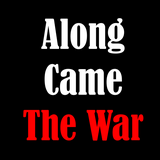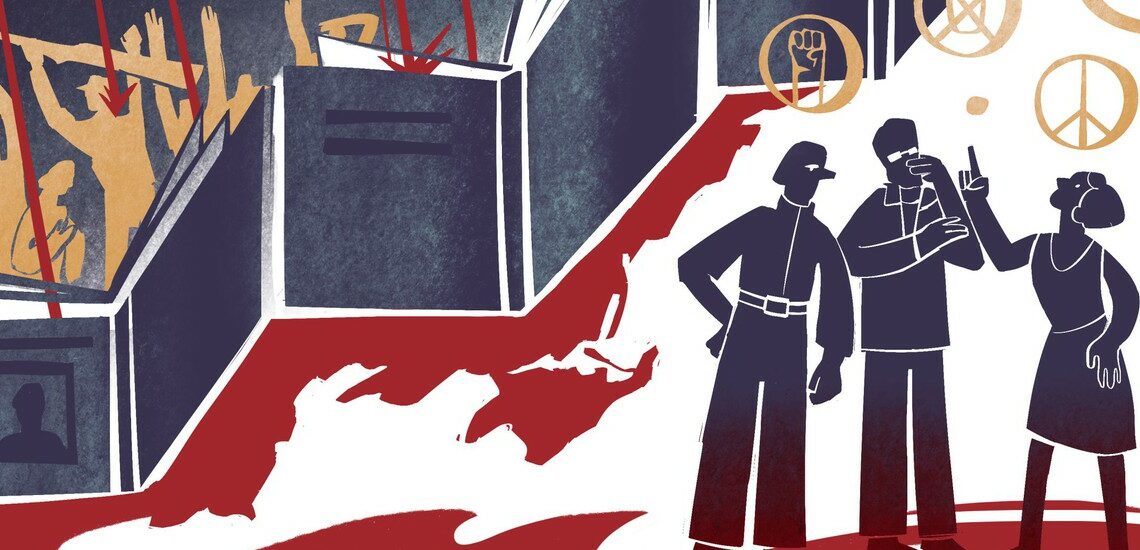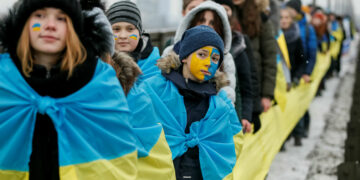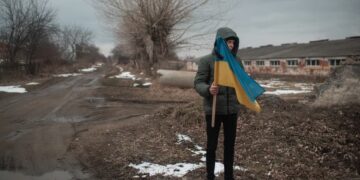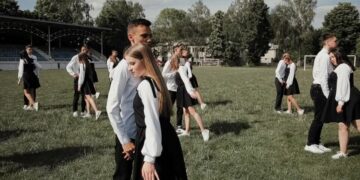The question of language and identity is often complex, particularly in nations with intricate historical ties to their neighbours. In Ukraine, the current use of Russian swear words, even among native Ukrainian speakers, presents a fascinating linguistic and cultural phenomenon.
Students’ responses offer a frank look at the perceived historical weight of the Russian language, the expressive power attributed to its profanities, and the evolving consciousness surrounding linguistic heritage in contemporary Ukraine. From the delay effects of Soviet-era Russification to the everyday influence of pop culture and the more recent currents of linguistic decolonization, these perspectives provide a valuable snapshot of how we, Ukrainians ourselves, understand this nuanced aspect of their daily speech. This exploration serves not only to answer the immediate question but also to illuminate the broader dynamics of language, culture, and identity in a post-colonial context.
Anna Anykiienko:
When people are willing to express their emotions, sometimes there is no better word than a swear word. And it really does work like a dopamine boost. Is it bad? I don’t think so. However, it is important to use it in the right context.
But why do Ukrainians use russian f-words? Maybe it’s a result of linguistic adaptation. Nevertheless, the long period of cultural occupation led to the consumption of russian content, literature, and vocabulary. That’s why people found it easier to use the most common swearing rather than search for native options.
So, what can we do to implement the Ukrainian language into this whole new linguistic layer? Learn. Learn and discover! Our swear words can express thoughts, feelings, and many other things in an even more accurate and beautiful way!
Olha Hrybivska:
I think that most people don’t realise that curse words that we use are russian. Throughout history, Ukrainians had their own way of expressing strong emotions verbally, but because of the russian influence a lot of them are forgotten.
In my opinion, people use curse words to release sudden strong feelings, in order to relieve the stress or ease the pain. This way, their pent-up emotions won’t burst out later.
Also, people might combine swear words with comical expressions to make their speech funnier or more engaging. It draws the attention of those who use f-words daily, since they feel like in such a company no one will judge them for explicit language.
Nevertheless, as educated people, we still need to learn how to shape our speech without using curse words, especially russian ones.
Olha Zadorozhna:
In my opinion, we still use these words because most people don’t even think about this issue. But more importantly, we haven’t yet discovered the beauty of our own swear words! The Ukrainian language actually has a wealthy collection of such expressions. Just think of the literary work “Enchanted Desna” by Oleksandr Dovzhenko and how many vivid phrases it contains to express dissatisfaction, anger, or contempt. There are even entire books that compile Ukrainian swear words, which can be cleverly used in everyday life. If we truly explore the richness and diversity of Ukrainian profanity, it would be easy to stop using Russian ones altogether.
Svitlana Burmistrova:
Many Ukrainians use russian swear words due to long-standing historical, cultural and linguistic influences. For decades, especially during the Soviet era, the russian language dominated many areas of Ukrainian life, including the media, education and everyday communication. As a result, russian swear words have become deeply embedded in the spoken language, even among native Ukrainian speakers. Consequently, people use russian swear words because they have been surrounded by such words. The Ukrainian language also has swearing, but because people are not aware of it, few of them use it to express their emotions.
Dariia Yakovleva:
Because of colonization. russian was everywhere – schools, media, army, cities. people just got used to swearing in russian, it was the norm for decades.
Plus russian f-word is super expressive and everywhere in pop culture. but after 2022 lots of Ukrainians will start switching to Ukrainian swears – it’s part of decolonizing the language.
Besides, I believe that there are many more curses (прокльони) in Ukrainian than just profanity, and therefore it is much easier to use an adjective or a noun than a whole sentence
Fediyk Bogdana:
russian TV, movies and music have been popular in Ukraine for many years, as a result, many Ukrainians pick up russian slang and f-words.
Julia Baran:
People resort to swearing when they struggle to find other words to express their emotions—whether anger, frustration, or even joy. Among teenagers, children, and some adults, swearing can also be seen as a sign of “coolness” and independence.
Anna Teslenko:
I guess we use their swear words because of long-term influence of their language and we really used to it. And probably because we have ‘лайка’ and curse and it’s not that strong to express all feelings and thoughts
Anastasia Voitsekhovska:
russian language has a much wider range of offensive/curse words compared to Ukrainian, and they have already become entrenched in our culture and turned into an informal slang. I think the reason is this
Maryna Andrushko:
Unfortunately, Ukraine has suffered and is still suffering from the imposition of everything Russian: language, culture. Swear words are quite common in any region of our country. Such expressions are a habit for any person. So I think that the use of these words in Russian is hidden in the subconscious. We don’t think about their origin when we talk.
However, I would like to add that we have our own swear words that can help people express their emotions.
Sophia Krasnovyd:
I guess russian f-words became widespread during the Soviet Union. russian was the dominant language in public life, education, the military, and media.
Kristina Kaliafitska:
Swear words like the F-word exist in most languages because they help people express strong emotions such as anger, pain, or surprise. They are often taboo because they deal with sensitive topics like sex or violence, which gives them extra emotional power. Swearing can also serve social functions — building bonds or expressing rebellion.
Many Ukrainians use Russian obscenities due to historical influence. During the Russian Empire and Soviet era, Russian was the dominant language in schools, the army, and public life. Russian “mat” became widespread, especially in urban areas. Ukrainian, on the other hand, traditionally used more metaphorical or euphemistic language. As a result, Russian swear words became embedded in everyday speech. Today, there’s growing awareness of this as a colonial legacy, and some Ukrainians are choosing to decolonize their language, even in how they swear.
Alexandra Sulim:
In our country, the Russian language has a very strong influence on our language.
First, we don’t have any obscene words, so we use Russian, so what’s the point? There are many curses in the Ukrainian language, like “May the devil bite you”. But these curses are in Ukrainian literature, but our people don’t pay much attention to Ukrainian literature, since it is not considered a classic of high art, so many people don’t even know what works we have.
Secondly, let’s remember our favourite TV series “Svaty”, in which there were 2 families, one stupid and funny, and the other intelligent. Of course, the first stupid family spoke Ukrainian, and the intelligentsia spoke russian. Watching this series, we won’t even pay attention, but it will remain in our minds. I didn’t hear any russian f-words in Zakarpattia.
Diana Kohut:
Honestly, I don’t understand why so many people, even here in Ukraine, still use Russian F-words and other offensive language from that toxic vocabulary. It feels wrong, especially now. These words are aggressive, vulgar, and carry the weight of a culture we are trying to move away from. We have our language, rich and expressive, yet we keep falling back on these dirty, borrowed phrases that don’t reflect who we are.
I hear them everywhere — in the streets, online, even from students like me. Maybe it became a habit during Soviet times or because of Russian media influence. But now, during the war, after everything Russia has done, it’s even more painful to hear their disgusting words in our mouths. It’s like we are cursing ourselves with the language of the enemy.
Sofia Miasoiedova:
We often use offensive or curse words in everyday life as a way to release emotions, express frustration, or emphasize a point and in Eastern Europe, this kind of language has a strong cultural presence. While people commonly refer to these curse words as “russian f-words,” in reality, we don’t strictly use russian profanity. Instead, we rely on a broader set of Eastern European curse words that span Ukrainian, Polish, Belarusian, and other Slavic languages. These expressions are deeply rooted in shared linguistic and cultural histories, and frequently, they sound almost identical across borders. So when we swear, it’s less about using russian specifically and more about tapping into a regional language of emotion that resonates across Eastern Europe.
Kristina Kostenko:
Many Ukrainians use russian swearing in everyday life because these words became common during the long period of russian influence, especially in the Soviet Union. People have heard them in movies, music, and everyday speech, so it became a habit. On the other hand, it is true that many native Ukrainian swear words are forgotten or replaced. This happened because russian or common slang took their place. Some traditional Ukrainian expressions are now known only in villages or to the old people. As a result, original Ukrainian ways of expressing emotions are pushed to the second place.
Alona Yakovenko:
Swearing is an inevitable part of our lives. Whether we like it or not, we have to admit that it is hard to imagine a mundane routine without it. This raises a logical question – why? What is the use of taboo lexicon in the world oriented on tolerance and mutual respect? I would like to share my humble opinion on that.
First, people use F-words as a reaction to unexpected or very unpleasant situations, such as a burn on the leg or a rat running past. So these words may be used as an interjection rather than an appeal to the specific addressee.
The second case is insulting other people. In case of being offended by someone, you want to pay them back, swearing at your oppressor. However, saying bad words isn’t necessarily used as a response to an offence. If you simply dislike something in your companion, you may be the one, who initiates a quarrel.
But why exactly we resort to F-words? What is wrong with normative vocabulary? Can’t they convey a precise emotion of what you want to say? Actually, yes. People apply bad words due to their strong meaning behind them. Euphemisms are deprived of the same brutal connotation as curses. Moreover, psychological factors also play a crucial role. It is well-acknowledged that the forbidden fruit is always the most tempting, so people most likely would use taboo language to show they can do something others can’t. As a result, people raise their self-esteem and improve their inner perception of themselves.
The other intriguing topic to discuss is why do we use russian swear-words. Although the Ukrainian language is rich in obscene lexicon, we wouldn’t claim that they are in high demand. So what is the reason for this?
For centuries, Ukrainian language has been under great influence of the russian one. It manifested in tight cultural integration from our neighbours in various aspects of our lives. Literature, cinema, music are few examples where we might have seen the effect of such ‘close relationships’ between two languages and cultures as well. As a result, it is really difficult to find a Ukrainian equivalent, since they were overshadowed by the russian’s.
Nowadays, we can’t help but mention that Ukrainian F-words are actively being revived by reintroducing them into the everyday speech. People try to recollect our authentic swearing in dictionaries and classical texts, which gives us hope for additional enhancements in the ongoing problem.
